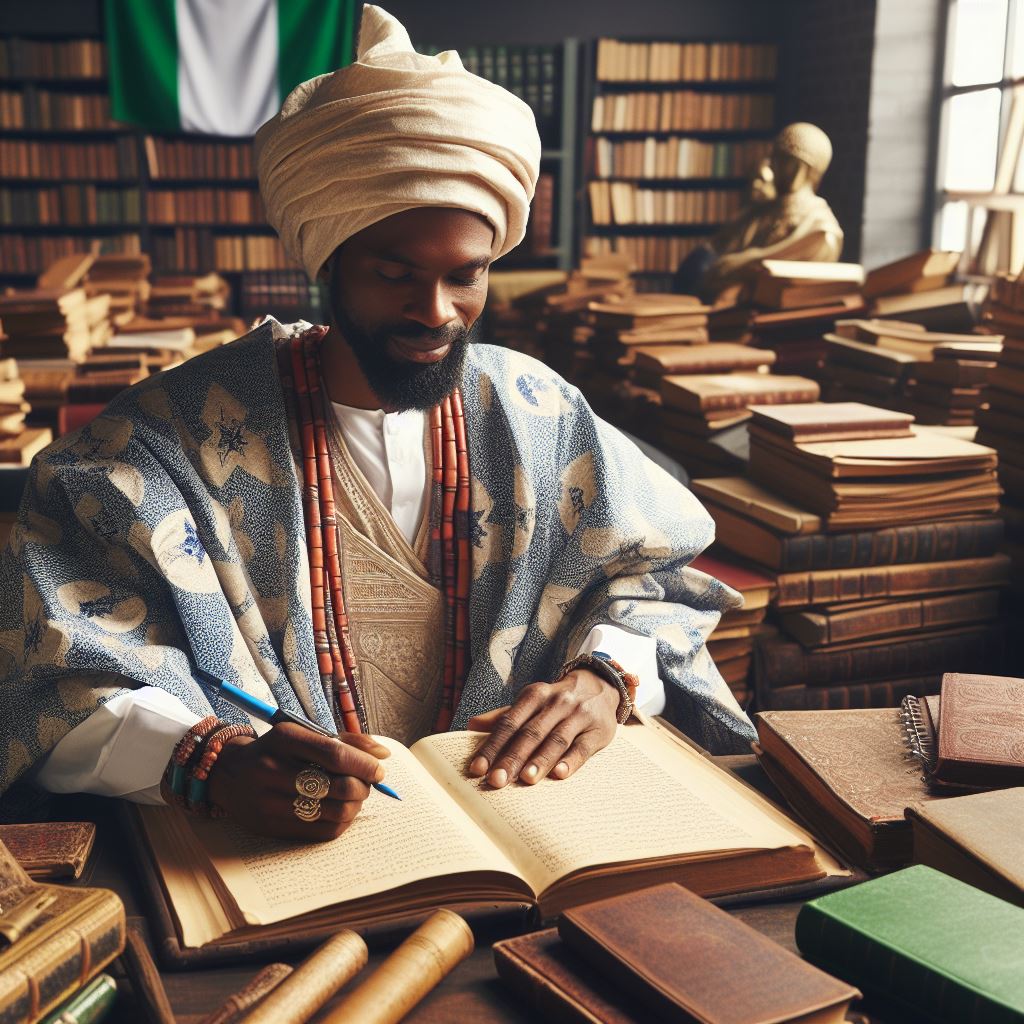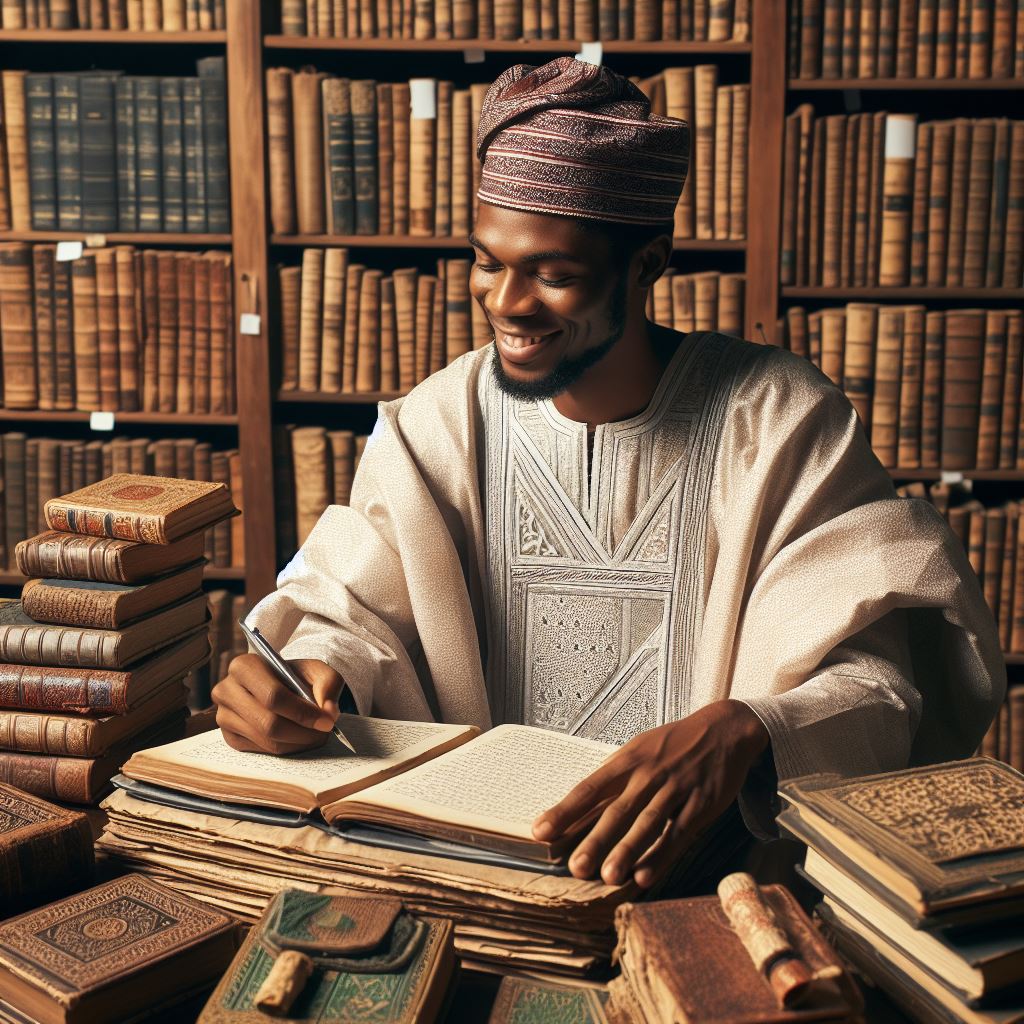Introduction
Studying African and Asian religions is significant in a global context.
These religions offer immense diversity and richness, enriching our understanding of human spirituality.
African religions, with their deep roots in tradition and community, provide unique insights into cultural practices and beliefs.
From the animistic and ancestral worship practices of West Africa to the vibrant spiritual traditions of East Africa, these religions highlight the integral role of spirituality in daily life.
Asian religions, like Buddhism, Hinduism, and Shintoism, showcase a wide array of philosophical and spiritual traditions.
The teachings of Buddhism emphasize the path to enlightenment through mindfulness and compassion.
Hinduism, with its pantheon of gods and intricate rituals, reflects the profound cultural heritage of India.
Shintoism, Japan’s indigenous religion, celebrates the sacredness of nature and the interconnectedness of all life.
In essence, the study of African and Asian religions not only enhances academic discourse but also promotes global peace and understanding.
By delving into these diverse spiritual traditions, we gain a deeper appreciation for the complexities of human belief systems and the ways in which they shape societies.
This understanding is crucial in today’s interconnected world, where cultural sensitivity and mutual respect are more important than ever.
Overview of African religions
The Different Belief Systems and Practices Found within African Traditional Religions
African traditional religions are diverse, encompassing various belief systems and practices.
These religions vary widely across regions and ethnic groups.
They share common themes such as the reverence for ancestors, spirits, and the natural world. Many African traditional religions have a strong focus on community and the interconnectedness of life.
The Importance of Ancestors, Spirits, and Nature in African Religious Beliefs
Ancestors hold a central place in African religious beliefs.
They are seen as intermediaries between the living and the spiritual world.
The living honor ancestors through rituals and ceremonies, seeking their guidance and blessings.
Spirits, both benevolent and malevolent, are believed to inhabit the natural world.
They influence various aspects of life, from health to agriculture.
Nature itself is sacred, with mountains, rivers, and forests often considered dwelling places of spirits.
Rituals and ceremonies are essential in African traditional religions.
They mark important life events such as births, marriages, and deaths.
These rituals often involve music, dance, and sacrifices.
They are a means of communicating with the spiritual world and maintaining harmony between the living and the spirits.
Divination is another common practice, used to seek answers from the spiritual realm regarding personal and communal issues.
How These Religions Have Been Influenced by Colonialism and Globalization
Colonialism had a profound impact on African traditional religions.
European colonial powers often suppressed indigenous practices, promoting Christianity and Islam instead.
Many African traditional religions were forced to go underground.
However, they adapted by incorporating elements of the dominant religions while preserving core beliefs and practices.
This syncretism is evident in many African societies today.
Globalization has further influenced African traditional religions.
Increased interaction with the global community has led to the spread of new ideas and practices.
Some traditional rituals have been modified to align with modern values and technologies.
For instance, traditional healers may now use modern medical knowledge alongside ancient practices.
Additionally, the diaspora has helped spread African traditional religions globally, leading to new interpretations and practices.
Despite these influences, African traditional religions remain resilient.
They continue to evolve, blending old and new elements.
This adaptability ensures their relevance in contemporary society.
Efforts to preserve and revive these religions are also growing, with many people recognizing their cultural and spiritual significance.
Basically, African traditional religions are rich and diverse, deeply rooted in the reverence for ancestors, spirits, and nature.
They have faced challenges from colonialism and globalization but have adapted and persisted.
Understanding these religions provides valuable insights into African culture and spirituality.
It also highlights the importance of preserving these traditions in the face of ongoing change.
Through the study of African traditional religions, we gain a deeper appreciation for the complexity and resilience of these spiritual practices.
This knowledge fosters greater cultural appreciation and contributes to a more inclusive and understanding global community.
Read: Digital Media Trends in Communication Arts
Comparison between African and Asian religions
When exploring African and Asian religions, it is important to understand the similarities and differences between the two.
Both African and Asian religious practices are deeply rooted in tradition and play a significant role in shaping the cultural identities of their respective regions.
Similarities between African and Asian religious practices
- Both African and Asian religions often involve a belief in a supreme being or a higher power.
- Rituals and ceremonies are integral components of both African and Asian religious traditions.
- Both types of religions emphasize the importance of community and communal worship.
- Many African and Asian religions place a strong emphasis on ancestor worship and honoring the spirits of the deceased.
Differences between African and Asian religious practices
- While African religions are more decentralized and diverse, Asian religions often have organized structures and hierarchies.
- African religions tend to have a stronger focus on the physical world and nature, while Asian religions often emphasize transcendence and enlightenment.
- Asian religions such as Buddhism and Hinduism have well-defined sacred texts, while African religions rely more on oral traditions and storytelling.
- The role of mythology differs between African and Asian religions, with African myths often emphasizing the interconnectedness of all living beings, while Asian myths focus on ethical principles and moral teachings.
The role of rituals, mythology, and sacred texts in African and Asian religions
Rituals, mythology, and sacred texts play crucial roles in both African and Asian religions.
Rituals are a way for believers to connect with the divine and create a sense of community.
Mythology serves to explain the origins of the universe, the divine beings, and the natural world. Sacred texts provide guidance on moral conduct, ethics, and spiritual practices.
How African and Asian religions have shaped cultural identities
African and Asian religions have played a significant role in shaping the cultural identities of their respective regions.
These religions are often intertwined with daily life, social customs, and traditional practices.
They provide a sense of belonging and continuity with the past, helping to maintain cultural heritage and strengthen communal ties.
The rituals, myths, and sacred texts of African and Asian religions serve as markers of identity and help to preserve the unique traditions of each region.
Essentially, while African and Asian religions share some similarities, they also have distinct characteristics that reflect the diversity of human spiritual beliefs and practices.
By examining the role of rituals, mythology, and sacred texts in these religions, we gain a deeper understanding of how they have shaped the cultural identities of their respective regions.
Read: Comparing Communication Arts and Mass Communication
Impact of Western religions on African and Asian belief systems
In examining the impact of Christianity and Islam on traditional African and Asian religions, it is crucial to recognize the profound influence these Western religions have had on indigenous belief systems.
Introduction of Christianity and Islam
The introduction of Christianity and Islam to Africa and Asia led to significant changes in the spiritual landscape.
Missionaries and traders played a key role in spreading these religions, often intertwining them with local traditions.
Christianity, with its monotheistic beliefs and emphasis on salvation, challenged the polytheistic nature of many African and Asian religions.
Islamic teachings, on the other hand, brought a strict code of conduct and a strong sense of community.
Tensions and conflicts
The clash between traditional African and Asian religions and Western beliefs has resulted in tensions and conflicts.
In some cases, indigenous practices were labeled as pagan or idolatrous by missionaries, leading to cultural erasure and marginalization.
Resentment and resistance often followed, as communities sought to preserve their ancestral traditions and resist external domination.
This clash of worldviews has occasionally erupted into violence and persecution.
Syncretism and hybridization
To navigate this complex interplay of beliefs, syncretism and hybridization have emerged as important strategies.
Syncretism refers to the blending of elements from different religious traditions, creating a unique fusion of beliefs and practices.
Hybridization, on the other hand, involves the integration of diverse religious influences into a coherent and cohesive system.
This process allows for the preservation of indigenous customs while incorporating new spiritual insights from Christianity and Islam.
Generally, the impact of Western religions on African and Asian belief systems is multifaceted and continues to shape the religious landscape of these regions.
By understanding the dynamics of this encounter, we can appreciate the resilience and adaptability of traditional faiths in the face of external pressures.
Read: Developing Critical Thinking in Language Arts

Case Studies of Specific African and Asian Religions
Notable African Religions Such as Yoruba, Vodou, and Santeria
The Yoruba religion originates from the Yoruba people of Nigeria.
Yoruba religion centers on a pantheon of deities called Orishas.
These deities represent various forces of nature and human endeavors.
Rituals, sacrifices, and divination are integral to Yoruba religious practices.
Yoruba religion has influenced and blended with other cultures, particularly in the Americas, due to the transatlantic slave trade.
Vodou, often misunderstood, is a syncretic religion that combines African, Catholic, and indigenous beliefs.
Originating in Haiti, Vodou includes elements from Yoruba religion and other African spiritual systems.
Vodou practitioners honor spirits called Lwa, who act as intermediaries between humans and the Supreme Creator.
Rituals, music, dance, and drumming are essential to Vodou ceremonies, used to invoke the Lwa.
Santeria, another syncretic religion, emerged in Cuba among enslaved Africans.
Santeria merges Yoruba religion with Roman Catholicism.
Practitioners worship Orishas, often syncretized with Catholic saints.
Rituals, offerings, and drumming play crucial roles in Santeria practices.
Santeria has spread beyond Cuba, influencing spiritual practices in the Americas and Europe.
Prominent Asian Religions Like Hinduism, Buddhism, and Shinto
Hinduism, one of the oldest religions, originated in the Indian subcontinent.
Hinduism encompasses diverse beliefs and practices, with no single founder.
Key concepts include Dharma (duty), Karma (action and its consequences), and Moksha (liberation from the cycle of rebirth).
Hindu rituals involve worship (puja), recitation of scriptures, and pilgrimage to sacred sites.
Hinduism’s rich mythology and philosophical schools have profoundly influenced Indian culture.
Buddhism, founded by Siddhartha Gautama (the Buddha), also originated in India.
Buddhism teaches the Four Noble Truths and the Eightfold Path, guiding followers toward enlightenment (Nirvana).
Buddhist practices include meditation, ethical conduct, and mindfulness.
Buddhism spread across Asia, adapting to local cultures.
It has diverse traditions, such as Theravada, Mahayana, and Vajrayana, each with unique practices and interpretations.
Shinto, Japan’s indigenous religion, focuses on the worship of Kami, spirits associated with natural elements and ancestors.
Furthermore, Shinto practices involve rituals, festivals, and purification rites performed at shrines.
Shinto emphasizes harmony with nature and reverence for ancestors.
Though often practiced alongside Buddhism, Shinto remains a distinct and vital part of Japanese culture.
Context on the History, Beliefs, and Practices of These Religions
Yoruba religion’s history dates back centuries, rooted in the Yoruba people’s rich cultural heritage.
It emphasizes community, respect for elders, and balance between the physical and spiritual worlds.
Yoruba rituals, including drumming, chanting, and divination, aim to maintain harmony and seek guidance from Orishas.
Vodou’s history reflects the resilience of enslaved Africans in Haiti.
It blends African, Catholic, and indigenous elements, reflecting Haiti’s complex history.
Vodou rituals involve invoking Lwa, offering sacrifices, and engaging in vibrant ceremonies to seek protection, healing, and guidance.
Santeria developed in Cuba, blending Yoruba traditions with Catholic elements.
It provides a means for practitioners to connect with their African heritage and navigate life’s challenges through rituals, offerings, and communication with Orishas.
Hinduism’s history spans thousands of years, evolving through various cultural and philosophical developments.
It encompasses diverse practices and beliefs, including yoga, meditation, and devotion to deities.
Hinduism’s flexibility allows it to adapt to different cultural contexts while maintaining core principles.
Buddhism’s spread across Asia led to diverse traditions and practices.
Despite variations, all Buddhist schools share core teachings on suffering, impermanence, and the path to enlightenment.
Meditation, ethical living, and wisdom are central to Buddhist practice.
Shinto’s history is deeply intertwined with Japan’s cultural and historical development.
Shinto rituals, festivals, and shrine visits emphasize purification, reverence for Kami, and harmony with nature.
Shinto’s influence extends to Japanese art, literature, and daily life.
Ultimately, studying African and Asian religions reveals a rich tapestry of beliefs, practices, and histories.
Understanding these religions fosters cultural appreciation and interfaith dialogue, highlighting humanity’s diverse spiritual heritage.
This exploration enriches our global perspective, promoting mutual respect and deeper connections across cultures.
Read: How to Apply for Communication Arts Programs
Gain More Insights: Best Private Music Academies in Nigeria
Gain More Insights: Community Engagement in African and Asian Studies
Contemporary Issues Facing African and Asian Religions
As African and Asian religions navigate the challenges of modernization, globalization, and secularism, they are facing a profound shift in traditional belief systems.
Challenges of Modernization, Globalization, and Secularism
- Modernization brings technological advancements that can challenge traditional practices.
- Globalization introduces new ideas and influences from around the world.
- Secularism promotes a separation of religion from political and social institutions.
These forces can put pressure on African and Asian religions to adapt and evolve in response to changing societal norms.
Adapting to Changing Societal Norms and Technological Advancements
- African and Asian religions are incorporating modern elements while preserving core traditions.
- They are finding ways to connect with younger generations through digital platforms.
- Some religious leaders are using social media to reach a wider audience.
By embracing technological advancements, these religions are staying relevant in a rapidly changing world.
Role of Diaspora Communities in Preserving and Evolving Religious Traditions
- Diaspora communities play a crucial role in preserving African and Asian religious traditions.
- They provide a sense of community and connection to cultural roots for migrants.
- These communities also serve as hubs for the continued practice and evolution of these religions.
Through the diaspora, African and Asian religions are able to adapt to new environments while maintaining their authenticity.
Therefore, African and Asian religions are facing contemporary challenges, but they are also finding innovative ways to navigate these obstacles and thrive in a changing world.
Find Out More: Role of Government in Promoting Nigerian Arts
Delve into the Subject: Online Music Courses Available in Nigeria
Explore Further: Overview of Mass Communication Courses in Nigeria
Gain More Insights: Tips for Marketing Your Fashion Brand in Nigeria
Find Out More: Anthropology’s Contribution to Nigerian Education Systems
Conclusion
This blog explored the rich and diverse religions of Africa and Asia.
Studying these belief systems reveals their cultural significance and historical depth.
Understanding Yoruba, Vodou, Santeria, Hinduism, Buddhism, and Shinto promotes cultural appreciation and interfaith dialogue.
These religions’ practices, rituals, and philosophies offer insights into the societies from which they originate.
Emphasizing the importance of studying African and Asian religions fosters religious tolerance and mutual respect.
Delving into these belief systems highlights humanity’s spiritual diversity, enriching our global perspective.
African and Asian religions embody deep spiritual wisdom and cultural heritage, offering unique perspectives on life and the universe.
They demonstrate the interconnectedness of humanity through shared spiritual experiences.
By studying these religions, we uncover common values and moral teachings that resonate across cultures, bridging gaps between different communities.
Encouraging further exploration and research into these dynamic and influential religions deepens our understanding and appreciation of their contributions to world culture.
Scholars and enthusiasts alike can benefit from engaging with these traditions, broadening their knowledge and fostering a more inclusive and respectful global society.
In an increasingly interconnected world, appreciating the richness of African and Asian religions becomes essential for promoting peace, tolerance, and mutual respect among diverse populations.




